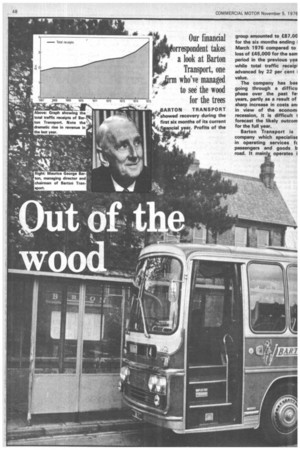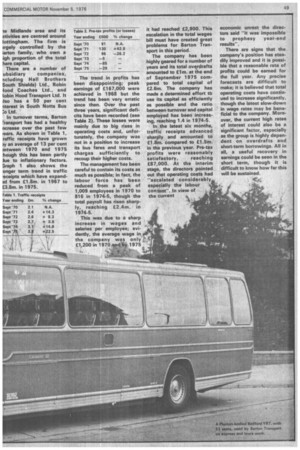Our financial rrespondent takes a look at Barton Transport, one fir 4 Ann who've managed tosee the wood for the trees
Page 50

Page 51

If you've noticed an error in this article please click here to report it so we can fix it.
ARTON TRANSPORT showed recovery during the first six months of its current f cial ear. Profits of the
group amounted to t87,00 for the six months ending i March 1976 compared to loss of £45,000 for the sang period in the previous year while total traffic receipl advanced by 22per cent i value.
The company has bee going through a difficu phase over the past fat years, partly as a result of sharp increase in costs an in view of the econom recession, it is difficult 1 forecast the likely outcorr for the full year.
Barton Transport is company which specialise in operating services fc passengers and goods h road. It mainly_ operates i le Midlands area and its ctivities are centred around lottingham. The firm is irgely controlled by the ■ arton family, who own a kigh proportion of the total hare capital.
There are a number of
ubsidiary companies, ncluding Hall Brothers South Shields) Ltd., Robin food Coaches Ltd., and Robin Hood Transport Ltd. It ilso has a 50 per cent nterest in South Notts Bus o Ltd.
In turnover terms, Barton -ransport has had a healthy ncrease over the past few rears. As shown in Table 1, raffic receipts have grown iy an average of 13 per cent mtween 1970 and 1975 hough this has been partly hie to inflationary factors. 3raph 1 also shows the onger term trend in traffic .eceipts which have expanded from £1.8m. in 1967 to £3.8m. in 1975.
Table 2. Pre-tax profits (or losses) Year ending E000 % change Sept '70 91 N.A.
Sept '71 130 +42.8 Sept '72 96 —26.2 Sept '73 —5 Sept '74 —85 Sept /5 —29
The trend in profits has been disappointing; peak earnings of £167,000 were achieved in 1968 but the trend has been very erratic since then. Over the past three years, significant deficits have been recorded (see Table 2). These losses were mainly due to big rises in operating costs and, unfortunately, the company was not in a position to increase its bus fares and transport charges sufficiently to recoup their higher costs.
The management has been careful to contain its costs as much as possible; in fact, the labour force has been reduced from a peak of 1,009 employees in 1970 to 816 in 1974-5, though the total payroll has risen sharply, reaching £2.4m. in 19/4-5.
This was due to a sharp increase in wages and salaries per employee; evidently, the average wage in the company was only £1,200 in 197010" 1975 it had reached £2,900. This escalation in the total wages bill must have created great problems for Barton Transport in this period.
The company has been highly geared for a number of years and its total overdrafts amounted to £1m. at the end of September 1975 compared to total capital of £2.6m. The company has made a determined effort lb use its capital as efficiently as possible and the ratio between turnover and capital employed has been increasing, reaching 1.4 in 1974-5.
In the latest six months, traffic receipts advanced sharply and amounted to £1.8m. compared to E1.5m. in the previous year. Pre-tax profits were reasonably satisfactory, reaching £87,000. At the interim stage, the directors pointed out that operating costs had "escalated considerably especially the labour content". In view of the current economic unrest the directors said "it was impossible to prophesy year-end results".
There are signs that the company's position has steadily improved and it is possible that a reasonable rate of profits could be earned for the full year. Any precise forecasts are difficult to make; it is believed that total operating costs have continued to increase significantly, though the latest slow-down in wage rates may be beneficial to the company. Moreover, the current high rates of interest could also be a significant factor, especially as the group is highly dependent on overdrafts and short-term borrowings. All in all, a useful recovery in earnings could be seen in the short term, though it is difficult to know how far this will be sustained.
































































































